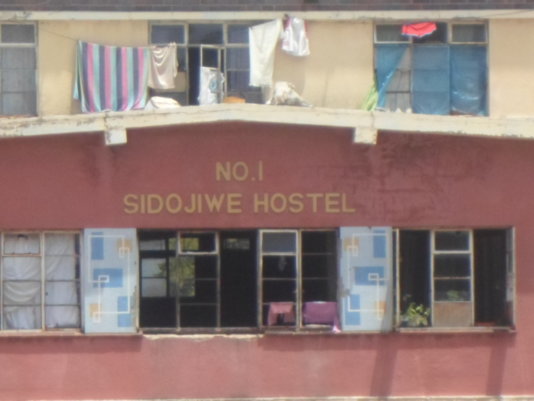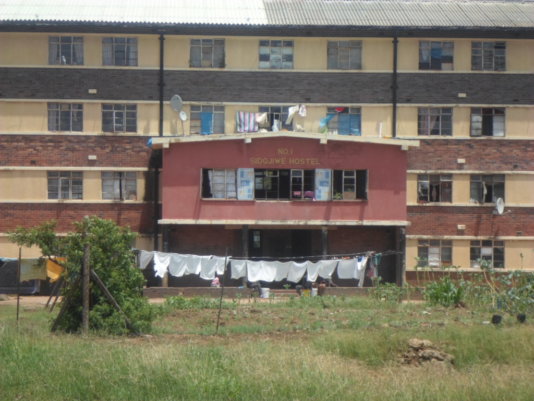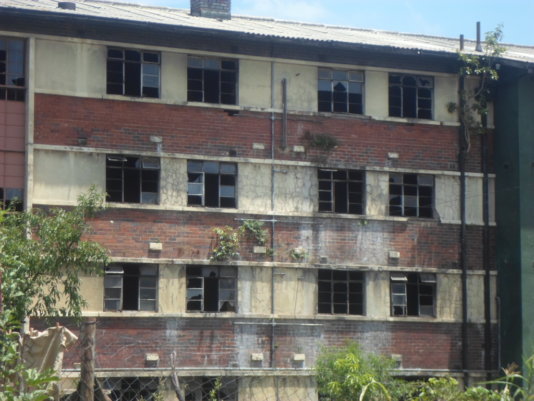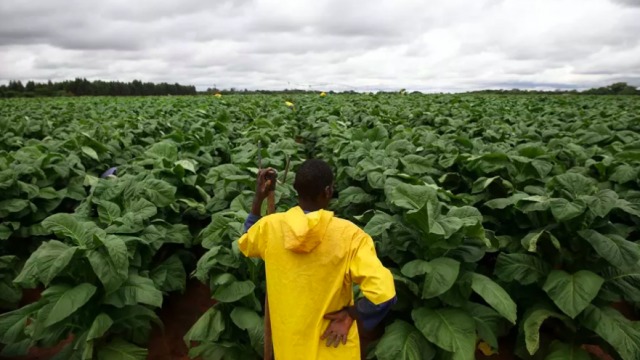- About
- Topics
- Picks
- Audio
- Story
- In-Depth
- Opinion
- News
- Donate
- Signup for our newsletterOur Editors' Best Picks.Send
Read, Debate: Engage.
| February 10, 2016 | |
|---|---|
| topic: | Health and Sanitation |
| tags: | #environment, #housing shortage, #Sidojiwe, #Zimbabwe |
| located: | Zimbabwe |
| by: | Rosemary Musvipwa |
The now out-dated Sidojiwe flats, located in the Donnington Industrial area of Bulawayo, are hostels that were originally constructed in the 1950’s to accommodate bachelors who were working in the industries during the colonial period. To date, these flats are now occupied by several families with the arrangement in which at least two families fit into to each room.
“In our room we are two families, and we have divided our sides using some old boards and curtains. I live with my two daughters and their children and we have come to accept what we have because we cannot afford the rentals in other places,” said Sichelesile Magutshwa.
Sidojiwe- meaning “we have been picked up” in the local Ndebele language ironically points to their need for a helping hand that will pick them up and place them in better housing conditions.
The dilapidated walls and the broken windows (some covered with plastics and cardboard to provide protection from the weather elements) of the hostels tell the story of neglected property and a people living in a desperate state. The residents make use of communal kitchens, toilets and bathrooms and are also met with poor water supplies which all compromise the hygienic standards of the community. To top it all off, the sewer pools that are beside their residence present a further health hazard and a source of air pollution.
“We are used to the smell and the environment now but it does not change the fact that the situation for us is bad. Almost everyone uses firewood to cook and we use the water that is available at any given time,” said Sipho Ncube resignedly.
Most of the residents are unemployed or have been retrenched from their former places of work. The downturn in the economy has exacerbated the poverty stricken lives of the Sidojiwe flats residents as most of them are struggling to make ends meet just enough to give them a decent life. For the younger generation that is growing up in these impoverished circumstances the future is not very promising, as many children do not attend school or drop out at the critical stages for non-payment of fees.
“For me, I see many unfortunate people around me. I was retrenched from my job at a nearby clothing factory and eventually found myself out of my former lodgings, then I ended up living here with my cousin. I am a man who ought to be doing better but jobs are hard to come by and so I am living on the bare minimum that I get from gardening piece jobs that I do,” said Justin Mdlongwa.
“It is better if you try to earn an honest living even if it is hard. There are others here who out of the desire to survive the harsh conditions, have turned to a life of being a criminal. Others that we see, I mean women and some young girls are selling their bodies to get a dollar. It’s very sad I tell you, very sad,” lamented Mdlongwa.
“I am trying whatever is possible to earn a living and provide for my family. I want to move out one of these days but things are not very smooth. I try to save up some money now and again from the jobs I do. I go around neighbourhoods seeking menial work to do, sometimes I wash clothes, iron, clean, sweep the yard and during the ploughing season like now I till the land for a few dollars or payment in kind,” explained a woman who identified herself as MaTshuma.
Help on the horizon?
The issue of affordable urban housing for Zimbabweans in general and that of poorer communities in particular is of great concern. Squatter or slum settlements have over the years mushroomed countrywide and are a reflection of the lack of affordable housing for the urban poor. Many are the victims of this shortage of housing are turning to staying in inhabitable environments while waiting for a sustainable change.
The Mayor of Bulawayo, Councillor Martin Moyo says the residents of the Sidojiwe flats are “not forgotten but at the moment there is nothing that can be done because we (City Council) are without resources.”
Councillor Moyo said that the city council is aware of the desperate plight of the residents and that although much progress has not been made, plans were in the pipeline to try to relocate the residents of Sidojiwe to an area where they could get more “homely” accommodation.
“A piece of land had been identified in Cowdray Park for that purpose, but nothing has happened because the funds are not there and there is no donor that is forthcoming to build those homes,” said Councillor Moyo.
“We are designing a re-development programme which is about doing away with all the poor archaic structures and putting up new, modern and friendly structures where people can live. We would like to do the same with Makokoba, Sidojiwe and its counterpart the other flats at Burombo as that is the same scenario,” explained Councillor Moyo.
If and when the funds become available and residents are still not relocated the city council could be presented with the option of repairing the existing buildings to make them more habitable.
“If those structures remain standing they must undergo extensive renovation and repartitioning so that we could perhaps have families living there instead of them living like animals because it’s not what we want,” reassured Councillor Moyo.
By copying the embed code below, you agree to adhere to our republishing guidelines.



